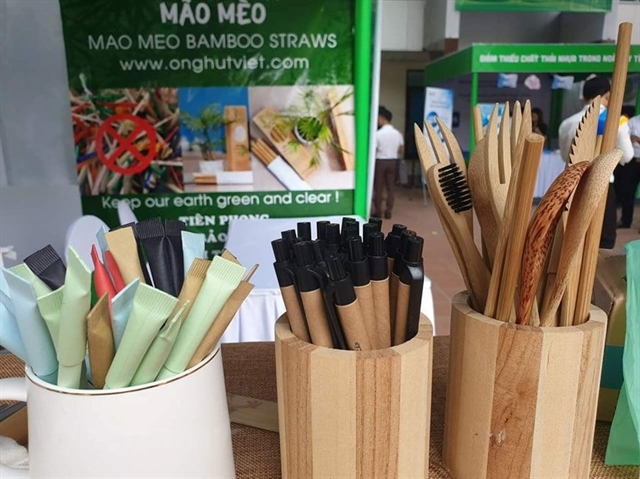 Environment
Environment

Director of the Environmental Technology Centre under the Institute of Environmental Technology Phùng Chí Sỹ speaks to Hải quan (Customs) newspaper about measures to help business tap opportunities to develop eco-friendly products

|
| Eco-friendly products are displayed at an exhibition held by the Ministry of Health in Hà Nội on August 16. Photo Vietnamplus |
Director of the Environmental Technology Centre under the Institute of Environmental Technology Phùng Chí Sỹ speaks to Hải quan (Customs) newspaper about measures to help business tap opportunities to develop eco-friendly products
The Government has recently called on the business community to raise its social responsibility, particularly in reducing plastic waste. Is this an opportunity for businesses to produce environmentally-friendly products?
The Government, ministries and sectors have found different ways to reduce plastic waste. Many businesses have started to produce environmentally-friendly products. However, some businesses just add more ingredients such as corn and cassava flour to help their products decompose more easily. These products, however, still contain plastic components.
Plastic waste reduction policies may not encourage the production of eco-friendly products.
But there is now a trend in reducing the use of plastic products so all production eco-friendly or bio-products will have opportunities to develop such as straws made of bamboo, metal, glass, green grass or rice flour.
We need to understand environmentally-friendly products are products that can be reused many times and do not harm the environment when disposed of. Particularly, the production process of these products should not cause environmental pollution.
So in this period of green economic development or sustainable economic development, the production of eco-friendly products will have much room to develop.
Which policies are needed to support businesses producing eco-friendly products to fulfil the country’s target of reducing plastic waste?
The cost to produce an eco-friendly nylon bag may be double that of a normal nylon bag. So to create conditions for businesses to produce eco-friendly products, production costs must be competitive with normal products.
Regarding policies, the law on environmental protection tax has a regulation imposing an environmental tax on the production of normal nylon bags.
The Ministry of Natural Resources and Environment has criteria on bioplastic bags that are easily broken down and will permit eligible businesses to produce eco-friendly products. Accordingly, these businesses will enjoy preferential policies.
The Vietnam Environmental Protection Fund also provides support for these businesses to get access to credit at low interest rates.
However, shortcomings remain between legal documents and the implementation so many businesses find it hard to benefit from these preferential policies. In fact, these businesses have to go through “many doors” to get access to the preferential policies, which has discouraged them. Some business say it is easier to complete procedures to get loans from banks than applying for such financial support.
So it can be seen that supporting policies tailored for businesses must comply with real conditions and have transparent mechanisms.
What should businesses do to tap the opportunities to develop eco-friendly products?
The consumption market will act as a decisive factor in the development of eco-friendly products so businesses must learn from the markets of developing countries.
We have had eco-friendly products to replace plastic bags for a while, such as using banana and lotus leaves to wrap products, but this has not been developed into a big market. So businesses need to base their actions on real demand to produce appropriate products.
To make eco-friendly products of high competitiveness, businesses should invest in eco-friendly technology which discharges fewer exhaust fumes and consumes less energy.
With appropriate technology and reasonable production costs and consumer prices, eco-friendly products can compete with normal plastic products. VNS




